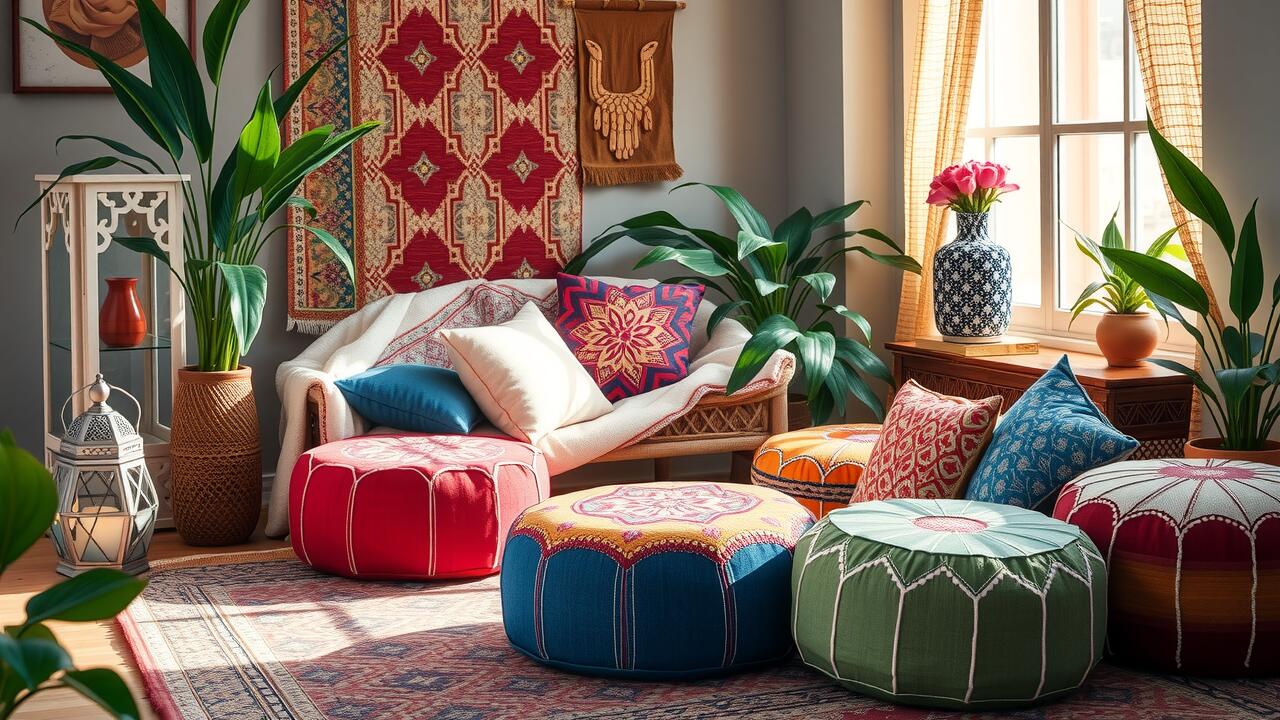
Table Of Contents
Drying Your Moroccan Pouf
After washing your Moroccan pouf, proper drying is crucial to maintain its shape and texture. Start by blotting any excess water with absorbent towels. Avoid wringing or twisting the pouf to prevent damage. Ensure that it is placed in a well-ventilated area away from direct sunlight. Prolonged exposure to sun can fade colors and alter the leather.
It is advisable to allow the pouf to air dry completely before using it again. This process can take several hours or even days, depending on humidity levels in your environment. Regularly check for dampness, especially in hidden corners. Proper drying will help to preserve the integrity of the pouf and prevent mold growth.
Find out further details by clicking here.
Best Practices for Air Drying
To ensure your Moroccan pouf dries thoroughly, place it in a well-ventilated area away from direct sunlight. Excessive heat can cause the leather to crack, so a shady spot is ideal. If possible, elevate the pouf slightly above the ground. This allows airflow underneath, which speeds up the drying process without risking moisture accumulation at the base.
To monitor the drying progress, lightly touch various areas of the pouf, checking for dampness. Depending on humidity levels and the cleaning method used, drying times may vary. Avoid using hair dryers or heaters, as these can damage the material. Patience is key; a natural air drying period can help maintain the integrity and appearance of your pouf.
Deodorizing Your Pouf
Over time, a Moroccan pouf may absorb odors from its environment, especially if it is used frequently. To combat unpleasant smells, a simple and effective approach is to sprinkle baking soda across the surface. This natural deodorizer works by absorbing unwanted odors rather than merely masking them. Allow the baking soda to sit for several hours or overnight for optimal results, then vacuum it up gently to avoid damaging the pouf's surface.
Alternatively, white vinegar can also serve as an excellent deodorizing agent. Mix equal parts of water and vinegar in a spray bottle, lightly mist the pouf while ensuring it does not become overly saturated. The vinegar smell will dissipate quickly as it dries, taking with it any lingering odors. This method not only freshens up the pouf but also helps maintain its color and texture. Always test any cleaning solution on a small, inconspicuous area first to avoid discoloration.
Natural Methods to Eliminate Odors
Baking soda serves as an excellent natural deodorizer for your Moroccan pouf. Simply sprinkle a generous amount over the surface and allow it to sit for several hours, or preferably overnight. The baking soda will absorb unwanted odors, leaving your pouf fresh and clean. After the waiting period, vacuum up the baking soda to restore the pouf’s texture. This method is not only effective but also gentle on the fabric.
Another option involves using essential oils to combat odors. A few drops of your favorite essential oil mixed with water can be sprayed lightly on the pouf. Try scents like lavender or eucalyptus for a refreshing aroma. Ensure the pouf does not become overly damp in the process. Allow it to air dry completely to prevent any moisture from lingering. These natural remedies can help maintain your pouf’s pleasant scent and integrity.
Preventative Care and Maintenance
Regular upkeep is essential for preserving the aesthetic and functional qualities of your Moroccan pouf. Consider placing it in a low-traffic area to minimize wear and tear. To prevent dust accumulation, use a soft brush or a handheld vacuum attachment to gently clean the surface every couple of weeks. This routine maintenance can significantly extend the life of the pouf and keep it looking fresh.
Using a protective fabric spray formulated for leather or natural materials can also be beneficial. This measure provides a barrier against spills and stains. Additionally, consider rotating the pouf periodically to ensure even aging and prevent one side from becoming more worn than the other. By incorporating these simple practices into your care routine, you can maintain the beauty and integrity of your pouf for years to come.
Tips to Extend the Life of Your Pouf
Proper care is essential for keeping your Moroccan pouf looking beautiful and lasting for years. Regularly fluff the pouf to maintain its shape and ensure the stuffing remains evenly distributed. When not in use, store it in a cool, dry place to avoid excess moisture that can lead to mold or mildew. Avoid placing heavy objects on top, as this can cause permanent indentations.
Cleaning spills and stains promptly will help maintain the pouf's appearance. Use a damp cloth and mild soap to gently dab the affected area. Allow it to air dry completely before using it again. Additionally, consider using a protective cover when the pouf is not in use, especially if it's placed in high-traffic areas. Doing so can shield it from dust and potential damage, enhancing its longevity.
FAQS
Can I machine wash my Moroccan pouf?
No, it is not recommended to machine wash a Moroccan pouf as it may damage the material and shape. Hand washing is the preferred method.
What is the best way to clean spills on my Moroccan pouf?
For spills, quickly blot the area with a clean, damp cloth to absorb as much liquid as possible. Avoid rubbing, as it may spread the stain.
How often should I clean my Moroccan pouf?
It’s advisable to clean your Moroccan pouf every few months, or more frequently if it experiences heavy use or spills.
Can I use cleaning products on my Moroccan pouf?
It’s best to use mild soap and water for cleaning. Avoid harsh chemicals, as they can damage the leather and dyes used in the pouf.
What should I do if my Moroccan pouf develops an odor?
To eliminate odors, you can sprinkle baking soda on the pouf, let it sit for a few hours, and then vacuum it off. Natural air-drying can also help remove smells.